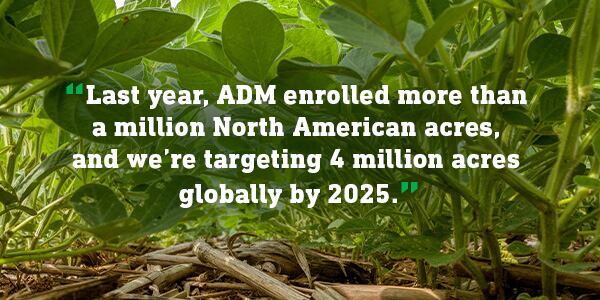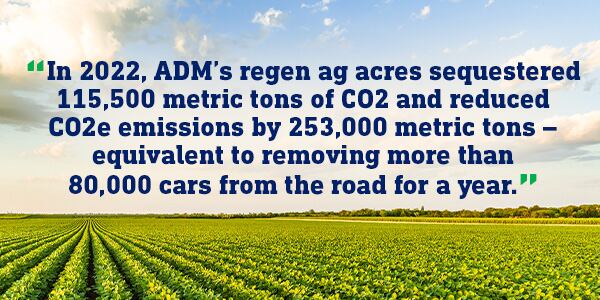ADM is one of the world’s largest agricultural supply chain managers and processors, and a pillar of the global food supply system.
Its purpose is to unlock the power of nature to enrich the quality of life, and we know we cannot achieve that purpose without a strong and unrelenting focus on protecting our planet, our communities and our people.
ADM is executing a comprehensive set of initiatives to enhance the sustainability of the supply chains in which it operates, and one of the foundations of those efforts is its work to support the broad expansion of regenerative agriculture practices.
It is tapping into its global network of hundreds of thousands of farmers; its unparalleled footprint spanning six continents; and its relationships with customers spanning food, feed, fuel, industrial and consumer products to power regenerative agriculture practices that will improve soil health, protect water quality, sequester carbon, reduce GHG emissions and increase overall land and soil resiliency – all while helping its customers lower their Scope 3 emissions and meet consumer demand for sustainably sourced products.
It all starts on the farm
ADM defines regenerative agriculture as practices based on indigenous ways of land management that are adaptive to local physical conditions and culture. ADM’s regenerative agriculture efforts are built on five principles: minimising soil disturbance; maintaining living roots in soil; continuously covering bare soil; maximizing diversity with an emphasis on crops, soil microbes, and pollinators; and responsibly managing inputs, including nutrients and pesticides.
From working with farmers around the globe, ADM knows that they want to do what’s right, and they understand that regenerative agriculture is critical to driving new value and securing the future of their businesses and the planet we all share.
ADM also knows that no two farms are the same, and is committed to bringing the best practices to empower farmers in the ways that work best for them. That’s why its regenerative agriculture programs feature direct financial support for farmers; easy processes and cutting-edge technologies to ensure low barriers to entry; and a broad range of support and expertise from third-party experts.
ADM offers financial incentives to growers on multiple fronts. The company has established process-based programs with rewards of up to $25 per acre for practices such as planting and maintenance of cover crops, double cropping to prevent bare or fallow soil, and implementing no-till or strip till practices. These practices can help minimize soil disturbance, cover bare soil, and maintain living roots year-round. ADM also offers outcomes-based programs that incentivize farmers for results, allowing growers to choose practices that are most impactful for their operations, such as focusing on responsible management of inputs to improve soil fertility and organic matter.
Ease of entry is powered both by ADM’s close relationships with growers around the globe, and its commitment to ensuring the best technology to support this critical work. In the US, for example, ADM is rolling out Farmers Business Network’s Gradable digital farm business management platform, which helps ensure that growers can accurately and efficiently manage and share data on their regenerative acres. Gradable offers a simple enrollment process for farmers, and smooth but thorough data collection that allows for quick and easy payments.
ADM is also working closely with third-party experts to power growth in regenerative agriculture. Technical assistance partners – including familiar independent organizations such as American Farmland Trust, Ducks Unlimited, Kansas Association of Conservation Districts and Practical Farmers of Iowa – provide producer support on a state-by-state basis, including explaining program details and qualifications, and providing guidance and education for successful practice implementation.

Regenerative agriculture at work in the US
In the US, ADM has successfully partnered with growers and customers alike through regenerative agriculture programs that span the entire value chain. Last year, ADM enrolled more than a million North American acres, and is targeting four million acres globally by 2025.
North American partnerships include a 7.5 year agreement with PepsiCo to support regenerative agriculture practices on up to two million acres of farmland. This partnership is propelling new ways in which both ADM and PepsiCo can create value throughout the supply chain by providing participants with technical and financial assistance, offering access to peer regenerative farming networks, hosting educational field days, and tracking results using trusted, third-party measurement systems.
ADM is also working with Nestlé to help bring regenerative agriculture practices to wheat farms within its DIGIORNO® supply chain. This partnership is delivering strong results so far: Working with wheat farmers across Kansas, North Dakota, Indiana and Missouri, the efforts have helped farmers sequester more than 3,800 metric tons of CO2e – the equivalent of taking nearly 850 gas-powered cars off the road for one year. Participating farms also saw higher crop yields versus weighted state averages.

Helping partners meet their emissions reduction targets
With food production responsible for up to one third of global greenhouse gas emissions, ADM views regenerative agriculture practices as a component of a holistic strategy to help decarbonise the many value chains in which it operates.1 ADM has committed to reducing Scope 3 emissions across its supply chain by 25% by 2035, and is working toward its aspiration of reaching net zero emissions by 2050.
Regenerative agriculture is a foundational component of this work: in 2022, its regen ag acres sequestered 115,500 metric tons of CO2 and reduced CO2e emissions by 253,000 metric tons – equivalent to removing more than 80,000 cars from the road for a year.
Building upon momentum and spreading regenerative agriculture practices
The crops ADM turns into an unparalleled array of plant-based products have always depended on healthy soil, water and air. Regenerative agriculture is critical to powering ADM’s business, living its purpose and changing the food and fuel systems of the future.
Learn more about ADM’s regenerative agriculture programs as it builds toward four million acres in 2025.
References
1. UN environment programme. Emissions gap report 2022: The Closing Window.








